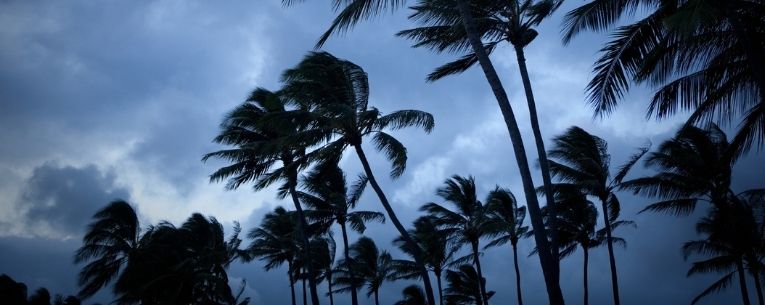Big storms and labor strikes are two things that can suddenly, unpredictably derail your travel plans, possibly leaving you stranded far from home. Customers often ask us if their travel insurance plan can cover losses related to strikes and severe storms. The answer is yes — but details and dates matter. Here are answers to some common questions about severe storm and strike travel insurance coverage.
Does travel insurance cover losses from hurricanes or storms?
In general, travel insurance can reimburse covered losses resulting from severe weather and natural disasters, but certain rules and requirements apply. The big one is that if a storm is foreseeable when you purchase your travel insurance plan, then your plan can’t cover losses resulting from that storm. (Other, unrelated losses can be covered.) A hurricane, tropical storm or winter storm may be considered either severe weather or a natural disaster, depending on how serious the storm is.
View our Coverage Alerts page for events considered known and foreseeable, as of the dates posted with them.
Can travel insurance help if severe weather damages my vacation rental or hotel?
If your travel insurance plan includes trip cancellation/interruption benefits, it can reimburse your prepaid, nonrefundable, unused trip costs in cases where your destination is uninhabitable. Insurance can also reimburse you if you cancel or interrupt a trip because your primary residence is uninhabitable.
Allianz Travel Insurance defines “uninhabitable” as follows: “A natural disaster, fire, flood, burglary, or vandalism has caused enough damage (including extended loss of power, gas, or water) to make a reasonable person find their home or destination inaccessible or unfit for use.”
Can travel insurance help if severe weather delays or cancels my trip?
Yes, it can. If your travel insurance plan includes trip cancellation/interruption benefits, it can reimburse your prepaid, nonrefundable, unused trip costs if:
- Your travel carrier is unable to get you to your original itinerary’s destination for at least 24 consecutive hours from the originally scheduled arrival time due to a natural disaster, severe weather, or another covered reason.
- Your tour operator cancels your multi-day tour that was purchased prior to your departure date due to a natural disaster, severe weather, or another covered reason.
Not only that, but travel delay benefits can reimburse you for unused, prepaid trip costs and additional expenses for meals, accommodation, communication, and transportation during your covered delay. And if you miss the departure of your cruise or tour due to severe weather (or another covered reason), you can be reimbursed for reasonable transportation expenses to rejoin your cruise/tour or reach your destination.
If severe weather derails your travel, just make sure you contact your travel carrier about alternative arrangements. Your transportation company may be able to get you to your destination via an alternate route.
What if a storm causes a mandatory evacuation of my travel destination?
If government authorities order a mandatory evacuation at your destination that goes into effect within 24 hours prior to your departure date or while you’re on your trip, that can be a covered reason for trip cancellation/interruption. Just know that you won’t be covered if you buy your travel insurance plan after the evacuation is announced or the severe weather event becomes a foreseeable threat.
What’s the best way to protect my upcoming trip in case of a severe storm or hurricane?
First, know the risks. The official Atlantic hurricane season lasts from June 1 to November 30, for instance. If you’re traveling to a coastal area during that time, travel insurance is a must. If you’re traveling to or through an area often affected by winter storms, you should get travel insurance too. Purchase a plan as soon as possible — ideally, right after you book your trip — to ensure vacation protection from storms and hurricanes.
Learn more: When's the Best Time to Buy Travel Insurance?
How does Allianz Partners define a foreseeable hurricane or storm?
Once the National Weather Service issues a warning for a storm or hurricane, it is considered a foreseeable event. Policies purchased on or after the warning date do not cover losses related to that event. If you’re buying a plan or filing a claim, and you’re not sure when a weather event or other event became foreseeable, check our Coverage Alerts page. The events listed are considered “known and foreseeable” for travel insurance purposes on the date listed next to the event.
Will travel insurance cover my losses if I cancel my trip because the weather’s bad, or because I’m worried about a storm?
No. If you cancel or interrupt a trip because something might happen, travel insurance can’t help. Anxiety, worry, or fear of an adverse event are not covered reasons for trip cancellation/interruption. The same goes for bad weather: If the forecast calls for rain every day of your beach vacation, that’s a bummer — but it’s not a covered reason for canceling the trip.
Can travel insurance help if my trip is canceled or delayed because of a strike?
If your Allianz Travel Insurance plan includes strike-related trip cancellation and interruption protection/trip delay benefits, you’re covered for related losses as long as insurance was purchased before the strike was threatened or announced.
When is a strike considered a foreseeable event?
Once a labor action such as a strike authorization has been voted on by a union, it is considered a foreseeable event.
Questions about how and when travel insurance covers weather- and strike-related losses? Contact us, and our travel insurance advisors will be happy to help.








Share this Page